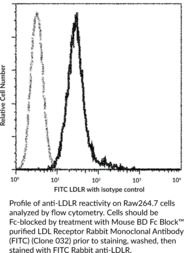Territorial Availability: Available through Bertin Technologies only in France
- Correlated keywords
- Apo E B HepG-2 Hep-G2 PCSK-9
- Product Overview:
LDL receptor (LDLR) is a cell surface glycoprotein that scavenges LDL from the blood and regulates plasma LDL levels.{13847} It is composed of an N-terminal signal sequence, a ligand-binding domain, an EGF precursor homology domain, an O-linked glycosylation domain, a transmembrane region, and a C-terminal cytoplasmic tail. LDLR is primarily expressed in the liver but is also found in the adrenal cortex.{13846} It mediates the endocytosis of LDL by binding to apolipoprotein E (ApoE) or ApoB on the LDL surface, thereby supplying cholesterol to cells.{13847} Protein levels of LDLR are decreased in HepG2 cells expressing proprotein convertase subtilisin kexin 9 (PCSK9).{13135} Knockout of Ldlr increases plasma levels of cholesterol and triglycerides and induces the formation of atherosclerotic lesions in mice.{9904} Mutations in LDLR are associated with familial hypercholesterolemia.{13160} Cayman’s LDL Receptor Rabbit Monoclonal Antibody (FITC) is composed of an LDLR monoclonal antibody conjugated to fluorescein isothiocyanate (FITC) and can be used for flow cytometry (FC).
Cayman Chemical’s mission is to help make research possible by supplying scientists worldwide with the basic research tools necessary for advancing human and animal health. Our utmost commitment to healthcare researchers is to offer the highest quality products with an affordable pricing policy.
Our scientists are experts in the synthesis, purification, and characterization of biochemicals ranging from small drug-like heterocycles to complex biolipids, fatty acids, and many others. We are also highly skilled in all aspects of assay and antibody development, protein expression, crystallization, and structure determination.
Over the past thirty years, Cayman developed a deep knowledge base in lipid biochemistry, including research involving the arachidonic acid cascade, inositol phosphates, and cannabinoids. This knowledge enabled the production of reagents of exceptional quality for cancer, oxidative injury, epigenetics, neuroscience, inflammation, metabolism, and many additional lines of research.
Our organic and analytical chemists specialize in the rapid development of manufacturing processes and analytical methods to carry out clinical and commercial GMP-API production. Pre-clinical drug discovery efforts are currently underway in the areas of bone restoration and repair, muscular dystrophy, oncology, and inflammation. A separate group of Ph.D.-level scientists are dedicated to offering Hit-to-Lead Discovery and Profiling Services for epigenetic targets. Our knowledgeable chemists can be contracted to perform complete sample analysis for analytes measured by the majority of our assays. We also offer a wide range of analytical services using LC-MS/MS, HPLC, GC, and many other techniques.
Accreditations
ISO/IEC 17025:2005
ISO Guide 34:2009
Cayman is a leader in the field of emerging drugs of abuse, providing high-purity Schedule I-V Controlled Substances to federally-licensed laboratories and qualified academic research institutions for forensic analyses. We are certified by ACLASS Accreditation Services with dual accreditation to ISO/IEC 17025:2005 and ISO Guide 34:2009.





